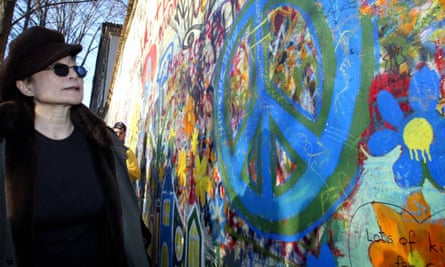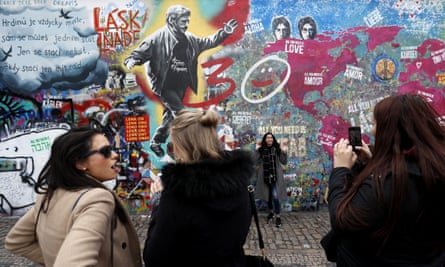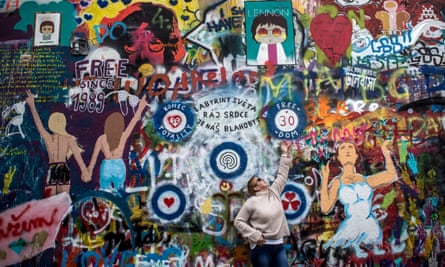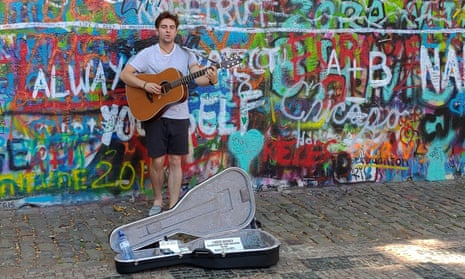Prague’s Lennon wall, long a symbol of free expression and resistance to communist-era surveillance, is to be monitored by TV cameras and converted into an open-air gallery with graffiti strictly regulated, in an effort to tackle rampant vandalism and obscene artwork by drunken foreign tourists.
Extra police will also patrol an area once renowned as a haven of rebellion against authority but now being overwhelmed by tourism. Some tour guides provide customers in their groups with paint to spray their own slogans.
“The Lennon wall is local but it’s a symptom of a broader problem concerning the whole centre of Prague,” the mayor of Prague 1, Pavel Čižinský, said.
The move by the Prague 1 municipality, which is responsible for the Czech capital’s historic tourist district, is ironic. It was the placing of surveillance cameras on the same spot by the then communist regime of Czechoslovakia in the 1970s to scrutinise the neighbouring French embassy that inspired critics to start daubing opposition slogans on the wall. It was nicknamed after John Lennon following his death in 1980.

The council decided to act after a criminal complaint from the wall’s owner, the Sovereign Order of Malta, a Christian charitable order based in an adjacent property. The order alleged that the once-sedate setting in the historic old town’s Malá Strana district was being destroyed by crowds of frequently drunk international tourists.
The Sovereign Order of Malta will first convert the wall into an open-air gallery, with international artists recruited to restore its original tradition honouring Lennon and Václav Havel, the former dissident who led the 1989 Velvet Revolution that toppled communism. New rules will prohibit daily spraying of the wall by members of the public and instead permit it only on agreed days.
It is part of a wider offensive to regulate a tourist trade often based on organised pub crawls that local officials fear is transforming the ambience of the ancient city while driving natives out.

Prague had a problem with “too many tourists visiting the same few places and iconic buildings, and is accompanied by some businessmen or companies operating in breach of the local laws and causing noise at night or disrespectful behaviour towards Prague”, said Čižinský.
A council investigation of one “historic tour” found that customers paying 600 Czech koruna (£21.50) were allowed to consume unlimited amounts of beer before finishing at the Lennon wall, where they were given stencils and paint to spray slogans. They were also offered free pies in exchange for leaving five-star reviews on TripAdvisor, the investigation found.
Residents and gallery owners in the area have complained that their properties are being damaged by spray paint and that the peace and quiet has been shattered by rowdy night-time behaviour.
“We invested a lot of money and resources to makes this a place of peace and relaxation,” said Marek Vaculcik, the owner of Artisème, an art gallery based behind the wall. “Instead, people have come and started to behave very badly, often drunk. They are leaving a lot of trash and spraying the trees. We don’t even want to clean the trees because it damages them.”

The wall has long been one of Prague’s leading cultural attractions, with its anti-communist origins recently inspiring imitations in Hong Kong during pro-democracy protests there.
But its former spirit of peaceful protest has been violated by recent sprayings that have included a depiction of male genitalia, as well as abusive messages attacking Brexit, Donald Trump and the police – the latter shortly after officers swooped on an organised tour and imposed fines for the illegal public drinking of alcohol. The tour company paid the fines and offered customers a free repeat tour as “compensation”.
Čižinský insisted that deploying cameras in the area was justified, adding that such surveillance was commonplace in central Prague.
“The romanticism of the 1980s protests are one thing, [but] the local people are already fed up,” he said. “To say that the use of cameras aiming at the Lennon wall will be some breakthrough – no. It is already normal.”
The decision follows a separate initiative by locals to combat another problem blamed on tourists – the supposedly romantic attaching of padlocks known as “lovelocks” to bridges and street lamps nearby. About 700kg of metal has been removed with high-powered cutters in recent months, erasing a problem that officials called “a plague” and which they said inflicted structural damage.
